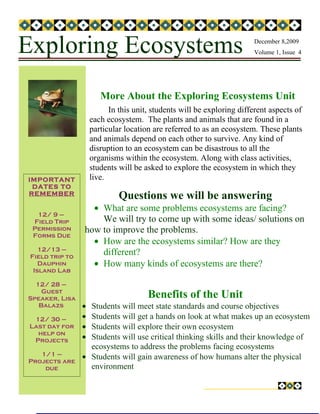
Newletter
- 1. Exploring Ecosystems December 8,2009 Volume 1, Issue 4 More About the Exploring Ecosystems Unit In this unit, students will be exploring different aspects of each ecosystem. The plants and animals that are found in a particular location are referred to as an ecosystem. These plants and animals depend on each other to survive. Any kind of disruption to an ecosystem can be disastrous to all the organisms within the ecosystem. Along with class activities, students will be asked to explore the ecosystem in which they IMPORTANT live. DATES TO REMEMBER Questions we will be answering • What are some problems ecosystems are facing? 12/ 9 – Field Trip We will try to come up with some ideas/ solutions on Permission how to improve the problems. Forms Due • How are the ecosystems similar? How are they 12/13 – Field trip to different? Dauphin • How many kinds of ecosystems are there? Island Lab 12/ 28 – Guest Speaker, Lisa Benefits of the Unit Balazs • Students will meet state standards and course objectives 12/ 30 – • Students will get a hands on look at what makes up an ecosystem Last day for • Students will explore their own ecosystem help on Projects • Students will use critical thinking skills and their knowledge of ecosystems to address the problems facing ecosystems 1/1 – • Students will gain awareness of how humans alter the physical Projects are due environment
- 2. Page 2 of 4 Exciting Ecosystems Project Based Learning Q & A Q: What is Project Based Learning? A: Project Based Learning (PBL) is an instructional approach, which involves specific learning activities designed to reflect “real world” learning. Q: Will students be meeting the objectives and standards for this course if PBL is employed? A: Yes, students will be learning the same information and will be meeting the same standards and objectives. They will also be relating the topic of study to real world situations. Q: Will the projects take valuable time away from other topics of study? A: No, students will spend the same amount of time on this topic as they have on other topics. Students will not receive written homework on this topic. Instead, I expect students to use this Unit Objectives time to work on their projects. • Students will be able to identify specific ecosystems when given a list of plants and/or animals that live there • Students will be able to list and describe the State Standards characteristics and features of • Identify components of various each ecosystem Ecosystems • Students will gain an • Identify ways in which humans alter the understanding of the impact physical environment humans can have on the These and other state standards can be found environment at http://alex.state.al.us/index.html
- 3. Exciting Ecosystems Page 3 of 4 Student Project Guidelines and Details To better understand the components of an ecosystem, students will be exploring their own ecosystems. Materials: -String -Paper -Small gardening tools (optional) -Magnifying glass (will be provided) -Thermometer (will be provided) - Popsicle sticks (will be provided) Procedure: - Locate a small patch of land to examine - Use string to partition a segment - Record observations about your ecosystem. Include all living and non-living things. - Record temperatures in your ecosystem - Dig up a small patch of turf. Look at the soil. What is beneath the surface? Conclusions: - Consider the variety of living and non-living things in your ecosystem. Which was the largest population? - How are the survival needs being met in your ecosystem? (Air, food, water, sunlight) - What population could not survive in your ecosystem? Project: - Write a one page paper describing your ecosystem. In this paper, be sure to answer all of the questions listed in the conclusions section. - Illustrate a picture of your ecosystem. Label any identified organisms. *I am aware that some students may have allergies which may limit their ability to do this project. I will model a sample Exploring Ecosystems project in class on the 12th. Students can use the information gathered from the demonstration to complete their project.
- 4. Exciting Ecosystems Page 4 of 4 What is the Role of the Student? Students are expected to complete and submit the assigned project on or before the due date. Students should do the project independently. They may use class notes and their textbook as references. It is the student’s responsibility to ask any questions about the project. Students can ask the teacher for guidance. Students who check out materials from the classroom are responsible for them. If the materials are not returned in the same condition they were received, students may be charged for their replacement. What is the Role of the Teacher? It is Ms. Morris’ job to make sure students and parents understand project requirements. The project will be explained and a copy of the project guidelines and details will be distributed and sent home with each student at least two weeks before the deadline. Ms. Morris will help direct and guide students who need extra help on the project. Extra help will be provided up until one day before the project is due. What is the Role of the Parent? Parents are expected to help facilitate the project. Parents can help direct students, but should not complete the project for their children. If a parent completes the project for their child, that student may receive a failing grade. Parents are encouraged to remind students to work on the project. To receive more information about our class, please visit the following sites. Contact http://cat250haleymorris.pbworks.com Teacher: Ms. Haley Morris Email: hmorris2007@gmail.com http://hmorris2007.livejournal.com Phone: 555-8714 Twitter: hmorris2007 http://hmorris2007.webs.com http://www.slideshare.net/hmorris2007 http://www.iKeepBookmarks.com/hmorris2007